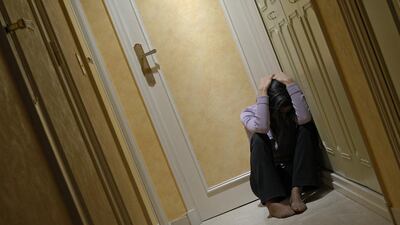Men of the world, imagine you’re walking down the street and you see someone being repeatedly hit on the face. There’s blood, there’s bruising. The victim is smaller and more passive than the attacker. What do you do?
Do you: try to intervene; call the police and expect the attacker to be prosecuted; or buy the victim some make-up and tell them to apply it gently to hide the shame of being attacked?
After all, concealer and foundation come in all skin tones these days and can hide the bloodiest of bruises.
Clearly, such a ridiculous range of multiple-choice options indicates that I’ve gone loopy. What man would fail to protect another man, call the police or at the very least intervene? And who could imagine cosmetics as the solution to a physical attack?
But I’m only out of my mind in disbelief because that is exactly what a Moroccan TV channel did last week.
In the morning segment of Sabahiyat on Channel 2M, a make-up artist stands in front of a woman made-up to have a swollen face with blue and black bruises, as though she has been beaten.
The presenter could have offered counselling, a list of support numbers, advice on how to tackle violent beatings or contact the police (which by the way in Morocco would not have helped because domestic violence is not a criminal offence at the moment).
Her solution to the violation of human dignity, freedom and safety? “We hope these beauty tips will help you carry on with your daily life.”
She elaborated: “It’s a painful and sorrowful topic, but on the occasion of the International Day for the Elimination of Violence Against Women, we will show you the make-up [to cover the signs] of beatings. It is a topic we lack the courage to discuss.”
Only after much criticism did the TV station issue an apology, stating that it was an editorial error.
This is not an error. This is a cover up, literally, of the fact that violence against women simply doesn’t register on the radar as something that is disgusting, repulsive and unacceptable.
We would not accept it if a man walked down the street and battered another man. There would rightly be uproar. We would not blame the victim, but criminalise and jail the attacker.
Yet behind closed doors, when women suffer, we make ourselves blind. In fact, we make women take the blame and ensure that we do not have to see them suffering.
The United Nations reports that one in three women worldwide have experienced physical or sexual abuse, mostly by an intimate partner.
In 2012, one in two women killed worldwide were killed by their partners or their family. This is violence of epidemic proportions against women – and we accept it as completely normal.
In fact, the mind boggles at the idea that women can and should go about their daily lives to the backdrop of violence.
This could be happening right now to a friend, a colleague or a neighbour. It might have happened to you. Or it might be you who is inflicting it on your wife. It is wrong. No ifs or buts. Wrong.
As the women who protested against the TV segment and started a petition made quite clear: “Do not cover domestic violence with make-up. Condemn the aggressor.”
If we would rush to the rescue of a stranger on the street being attacked, then we should have zero tolerance for violence and abuse to those closest to us in our homes.
Shelina Janmohamed is the author of Generation M: Young Muslims Changing the World
On Twitter: @loveinheadscarf

